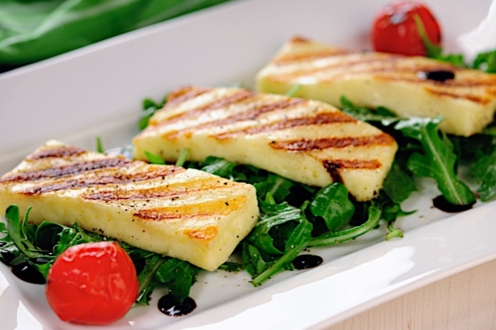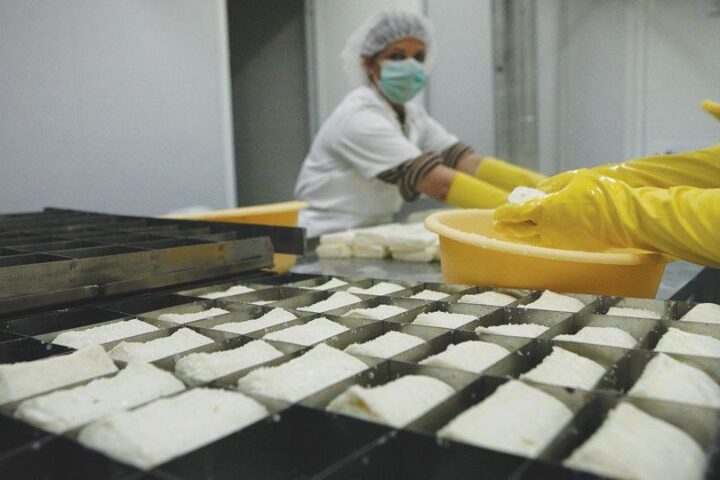Cypriot dairy producers are planning to enter supermarkets in Israel, excited over confirmation the country will lift all customs duty applicable to various cheese products, paving the way for halloumi to conquer another market.
During his visit to Cyprus for a trilateral meeting with President Nikos Christodoulides and Greek counterpart Kyriacos Mitsotakis in Nicosia, Israel’s Prime Minister Benjamin Netanyahu he welcomed the prospect of Cypriot Halloumi and Greek yoghurt prevailing in the market.
“We like your food,” he interjected off-script as Mitsotakis finished speaking.
“We like your dairy products. We like your yoghurt.”
Netanyahu said authorities would soon open the country’s dairy product market, which now protects local production with high import duties.
“We intend to open the dairy market very soon to Greek and Cypriot—and other—imports. May the best yoghurt win. You have a pretty good chance at winning.”
Encouraged by Netanyahu’s comments, Cypriot dairy producers are jumping at the opportunity to roll out their strategy.
In comments to the Financial Mirror, the head of the Cyprus Dairy Producers Association, Marios Constantinou, revealed that the association will meet Commerce Minister George Papanastasiou on Tuesday.
“We will meet with the minister to discuss the potential generated by the latest development.
“The opening of the Israeli market is certainly a very encouraging development for the industry and creates high expectations, potentially boosting exports,” said Constantinou.
Constantinou said Halloumi exports have been contributing to the upward trend of Cypriot exports, which, despite challenges in the supply chain, was €1.7 bln in 2022, an increase of 14.5% compared to the previous year.
Around €284 mln is generated by halloumi exports, exporting PDO (Protected Designation of Origin) certificate halloumi to dozens of countries.
“However, things will not be easy for us.
“Israel’s market is a tough nut to crack, even without the protective custom duties,” argued Constantinou.
“The lifting of the tax does not mean the Israeli market will suddenly be conquered by halloumi.”
Until recently, Halloumi imports to Israel were taxed with a duty of NIS 8.32 per kg, equal to €2.13, making the market unattractive.
Kosher products
“On the contrary, the market is still filled with challenges, mainly because exports must be Kosher.”
It is also important for the Cypriot industry, as there is not much demand in Israel at this stage.
“It is positive that steps and actions are being taken to grow this market as well.
“Today, halloumi exports, for example, to Israel are low.
“It is the smallest export market we have; we have been unable to sell significant quantities”.
Once the customs duties are lifted, the only essential requirement to export products to Israel is that they must be Kosher certified, Constantinou explained.
“Beyond that, we must also win over the market.”
The president of the Cyprus Cheesemakers’ Association said entrepreneurs in the sector should seize this opportunity, indicating that the results of these efforts will become visible.
“Our message as an Association is that members should jump at the opportunity and get in touch with Israeli companies to increase our sales.”
In recent comments to the Financial Mirror, Rabbi Levi Yudkin, the Director of Cyprus Kosher, the country’s only official kosher certification agency, confirmed Cypriot dairy producers’ increased interest in obtaining certification,
Cyprus Kosher was established in 2003 as a branch of the Chief Rabbinate of Cyprus – the supreme religious authority for Jewish law and practice.
Rabbi Yudkin said the list has been growing as factories seek to cover the needs of the local Jewish community but also boost their exports to Israel and other countries with Jewish communities.
“We have been busy with applications for Kosher certification from an ever-growing number of producers, from Halloumi to wines,” said Rabbi Yudkin.
He said Cyprus Kosher products have grown to include other Cypriot cheeses such as Anari and yoghurts.
The list has grown to include olives, olive oil, olive spreads, gourmet salt, tahini, and honey products.










